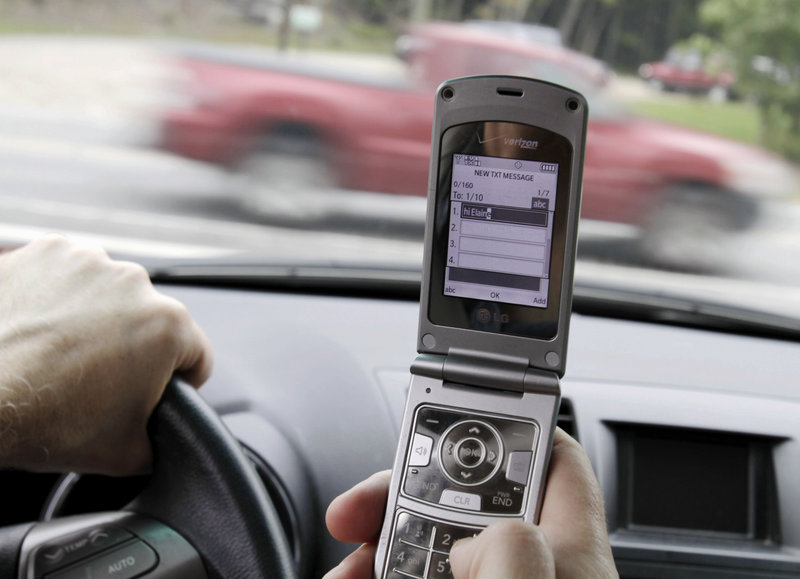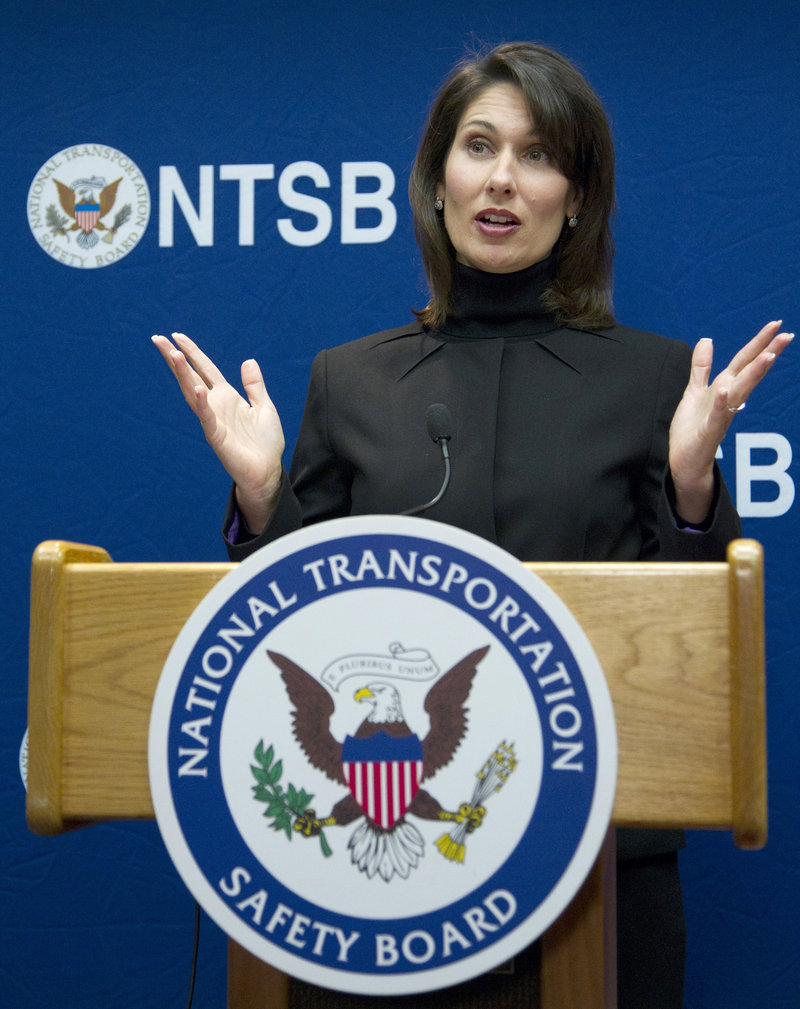WASHINGTON — Texting, emailing or using a cellphone while driving is simply too dangerous to be allowed anywhere, federal safety investigators declared Tuesday, recommending that all states impose a total ban except for emergencies.
Inspired by recent deadly crashes — including one in which a teen-ager sent or received 11 text messages in 11 minutes before an accident — the recommendation would apply even to hands-free devices, a much stricter rule than any current state law.
The unanimous recommendation by the five-member National Transportation Safety Board would make an exception for devices deemed to aid driver safety, such as GPS navigation systems.
Board chairwoman Deborah Hersman acknowledged the recommendation would be unpopular with many people and that complying would involve reversing what has become ingrained behavior for many Americans.
While the NTSB doesn’t have the power to impose restrictions, its recommendations carry significant weight with federal regulators and congressional and state lawmakers. Another recommendation issued Tuesday urges states to aggressively enforce current bans on text messaging and the use of cellphones and other portable electronic devices while driving.
“We’re not here to win a popularity contest,” she said. “No email, no text, no update, no call is worth a human life.”
Currently, 35 states, including Maine, ban texting while driving, and some bar cellphone use or emailing with hand-held devices. But enforcement is generally not a high priority, and no states ban the use of hands-free devices.
Stacey Doten of Kennebunk says her position as risk manager with Medical Mutual Insurance Co. of Maine prevents her from talking on her cellphone while she’s driving. If she needs to use her cellphone, she pulls over to the side of the road.
“I have mixed feelings about it,” Doten said of the NTSB recommendation.
“I see people all the time driving down the interstate and weaving. It’s scary, especially if they are typing something,” she said. “But on the other hand, I don’t think we should completely eliminate the use of cellphones (in cars).”
State Sen. William G. Diamond, D-Windham, sponsored legislation that led to the enactment of Maine’s texting ban. The state also has a broader law prohibiting distracted driving, which includes texting, talking on the phone, eating, tuning the radio or any other activity if it is distracting enough to contribute to an accident.
He likes the NTSB’s recommendation because in Diamond’s view, “it carries some political clout” that he believes will be enough to get a cellphone driving ban passed by the 2013 legislative session. Such a proposal would have little chance this session because of opposition from groups such as real estate agents, who rely on cellphones to do their jobs.
“Everyone knows in their hearts that talking on a cellphone when you’re driving is not the right thing to do,” said Diamond, who would back a ban.
However, Robert M. Schwartz, executive director of the Maine Chiefs of Police Association, believes such a restriction would impede police officers in the line of duty. Most officers now use cellphones, and some have hands-free cellphones in their cruisers.
“I’ve got to say it would hurt law enforcement in the mission we try to accomplish, but it’s also a safety issue. Your mind is not on the road when you are talking, even if it’s hands-free,” Schwartz said.
The immediate impetus for the recommendation of state bans was a deadly highway pileup near Gray Summit, Mo., last year in which a 19-year-old pickup driver sent and received a flurry of texts just before the accident, which killed both him and a student on a school bus involved in the crash. Thirty-eight others were injured.
Missouri had a law banning drivers under 21 years old from texting while driving at the time of the crash, but wasn’t aggressively enforcing the ban, board member Robert Sumwalt said.
“Without the enforcement, the laws don’t mean a whole lot,” he said.
NTSB investigators said they are seeing increasing texting, cellphone calls and other distracting behavior by drivers in accidents involving all kinds of transportation. It has become routine to immediately request the preservation of cellphone and texting records when an investigation is begun.
In the past few years the board has investigated a train collision in which the engineer was texting that killed 25 people in Chatsworth, Calif., and a fatal accident on the Delaware River near Philadelphia in which a tugboat pilot was talking on his cellphone and using a laptop computer.
Last year, a driver was dialing his cellphone when his truck crossed a highway median near Munfordville, Ky., and collided with a 15-passenger van. Eleven people were killed.
The National Highway Traffic Safety Administration reported earlier this year that pilot projects in Syracuse, N.Y., and Hartford, Conn., produced significant reductions in distracted driving by combining stepped-up ticketing with high-profile public education campaigns.
NHTSA found that in Syracuse, hand-held cellphone use and texting declined by a third. In Hartford, there was a 57 percent drop in hand-held phone use, and texting behind the wheel dropped by nearly three-quarters.
However, that was with blanket enforcement by police.
About two out of 10 American drivers overall — and half of drivers between 21 and 24 — say they’ve thumbed messages or emailed from the driver’s seat, according to a survey of more than 6,000 drivers by the National Highway Traffic Safety Administration.
However, the survey found that many drivers don’t think it’s dangerous when they do it — only when others do.
— Staff Writer Dennis Hoey contributed to this report
Send questions/comments to the editors.





Success. Please wait for the page to reload. If the page does not reload within 5 seconds, please refresh the page.
Enter your email and password to access comments.
Hi, to comment on stories you must . This profile is in addition to your subscription and website login.
Already have a commenting profile? .
Invalid username/password.
Please check your email to confirm and complete your registration.
Only subscribers are eligible to post comments. Please subscribe or login first for digital access. Here’s why.
Use the form below to reset your password. When you've submitted your account email, we will send an email with a reset code.